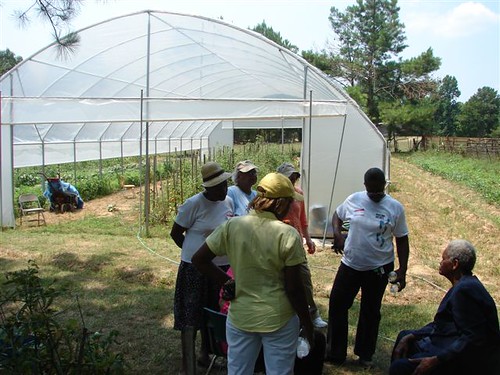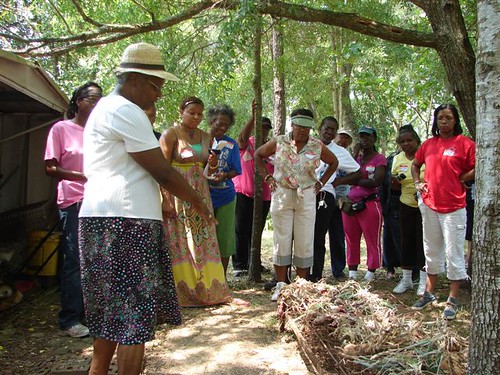
Mary McGee’s late father could neither read nor write. But he knew how to farm.
He could farm so well, his daughter says, he had a PhD in making things grow. He taught her how to transform idle soil into lush farmland and to take care of animals.
Now, her Florence, Miss. farm produces beautiful vegetables—and she’s using the lessons she acquired from her father to show friends and family the science of farming.
Although McGee farms the same land that her father did, it now boasts a new feature—a seasonal high tunnel. McGee worked with USDA’s Natural Resources Conservation Service (NRCS) to build the high tunnel, which is plastic wrapped around a metal frame that provides a warmer climate for fruits and vegetables. This allows McGee to lengthen her growing season by 10–12 weeks.
The high tunnel is especially helpful as the seasons change. Recently McGee has planted cabbage and other fall vegetables in the high tunnel, and she is excited to see how the high tunnel will allow her to farm in the winter.

NRCS’ Environmental Quality Incentives Program (EQIP) funded McGee’s high tunnel. It is one of six in Rankin County, Miss.—the highest number in the state.
McGee has taken it upon herself to show her neighbors how useful high tunnels are, through, for example, the South Rankin Farmers Association. She has also spoken at the Mississippi Federation of Southern Cooperatives Meeting, telling them about how NRCS has helped her improve her land. She even held a workshop this year, where members of Women in Agriculture could tour her farm and see her high tunnel.
Crops from her farm include corn, peanuts, butterbeans, string beans, peas, squash, peppers, turnip greens, mustard greens, collard greens, rutabagas, carrots, potatoes, onions and tomatoes. She also raises peaches, plums, figs, strawberries, blueberries, watermelons, muscadines and dewberries.
McGee’s father began farming on his own in 1957, when the owner of the farm he worked on died, and he bought five acres in Rankin County, Miss. He took pride in growing the cleanest cotton, which he sold for top dollar.
Like her father, McGee has always preferred low-input farming techniques like relying on compost for fertilizers and natural methods to manage pests. It’s about being closer to the earth, she says.

A seasonal high tunnel is a greenhouse-like structure, which creates more favorable growing conditions for vegetable and other specialty crops grown in the soil beneath.
NRCS’ three-year high tunnel pilot project is helping farmers increase the availability of locally grown produce. The project will also evaluate the conservation benefits of high tunnels, such as reducing pesticide use, keeping vital nutrients in the soil and conserving water. Mississippi is one of 43 states participating in the project, part of the USDA’s “Know Your Farmer, Know Your Food” initiative.
Read more about Know Your Farmer, Know Your Food and the seasonal high tunnel pilot project
Check out more conservation stories on the USDA blog.
Follow NRCS on Twitter.



